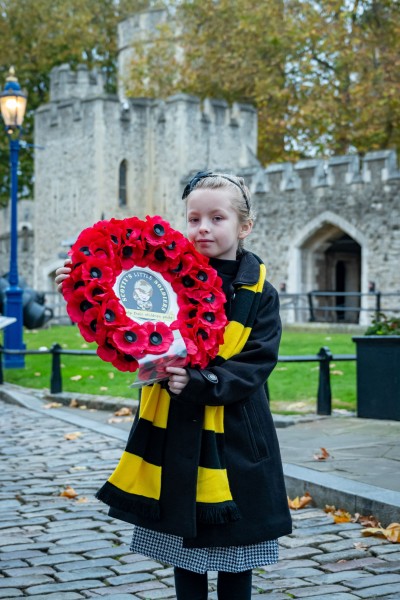What Does Remembrance Mean to a Bereaved Military Child?
War widow and founder of Scotty’s Little Soldiers, Nikki Scott, shares what Remembrance means to a bereaved military child, and why it is so important to remember the military families left behind.
For bereaved military children, Remembrance isn’t just two minutes of silence. It’s every day of their lives.
In 2009, my world fell apart when I received the news that every military wife dreads. My husband, Corporal Lee Scott, had been killed in Afghanistan. It was a horrific time, but one of the hardest parts was watching my two young children, Kai and Brooke, struggle to come to terms with the fact their daddy was dead. Kai was five at the time and telling him what had happened was the most difficult thing I’ve ever had to do. Brooke was just seven months old, and knowing she’d grow up with no memories of her dad broke my heart.
Seeing the devastating impact Lee’s death had on them, and with very limited support available, I set up Scotty’s Little Soldiers, the charity dedicated to supporting bereaved military children. We now support over 620 children and young people who have all experienced the death of a parent who served in the British Armed Forces.

Why is Remembrance difficult for bereaved military children?
Remembrance is a time of mixed emotions for our members. On the one hand, it makes them so proud to see hundreds of people join together to remember their parent and honour the sacrifice they made. On the other, it can bring back lots of painful memories surrounding their bereavement.
When we think about Remembrance, we often associate it with the older generations who fought in World War I and World War II, but at Scotty's we talk to families and children impacted by war every single day.
One Scotty member told us: “When people think of Remembrance, I think they forget about all the people who are fighting and dying right now. People like my dad. Everyone thinks about big World Wars because that’s what we learnt about in school, but there are people still out there risking their lives today.”
We recently asked a group of Scotty members how Remembrance makes them feel. The most common answers were ‘painful,’ ‘sad,’ and ‘proud.’
“For me, it can be happy but it can also be sad,” another member said. “I wake up on Remembrance knowing I'm going to spend the day thinking about my dad, but everyone talking about him gives me a better understanding of the kind of person he was and the stuff he was interested in.”
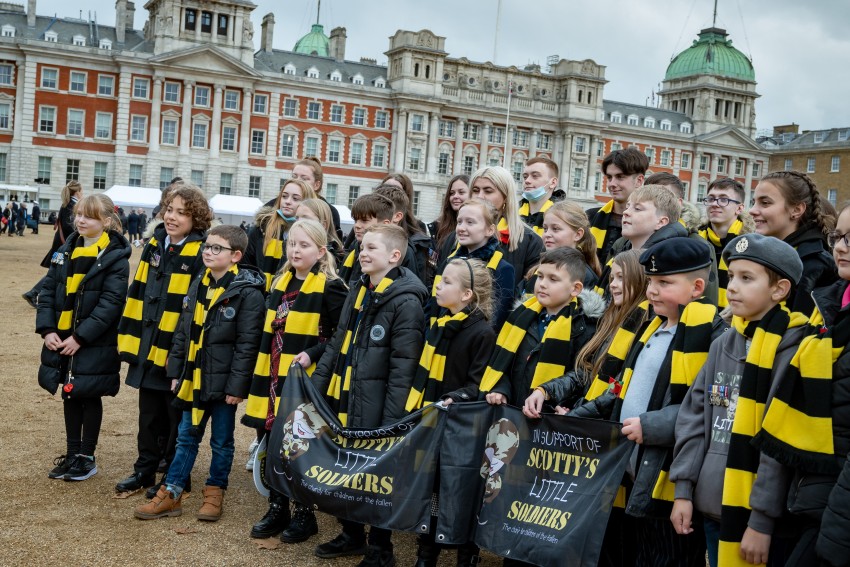
Bereaved Military Children: The Forgotten Mourners
Something I noticed very early on after Lee died is how the children and young people were always forgotten. It wasn’t intentional, but it was something I got very frustrated about. People would often ask how I was doing, tell me about support groups for widows and bereaved adults, but those offers of support were never aimed at the kids. It’s the reason I started Scotty’s Little Soldiers in the first place.
Unfortunately, Remembrance is often the same. When you look at the news, you see lots of adults who have experienced the death of a loved one who served in the Armed Forces, but the same attention is never paid to their children. Again, people automatically think of the older generation – the partners and the parents – and forget about the younger generation.
This is sometimes made worse by other children – often those who don’t have any military connections or don’t realise how important Remembrance is – not taking part in something like a two-minute silence at school.
One of our young Scotty members told us: “When I’m walking around school on Remembrance Day, I’ve heard a few people say, ‘why do we still have Remembrance when World War I and World War II were ages ago?’ I stopped a few of them and said it’s because there are still people today fighting for our country and dying because of it. But, because it doesn’t affect them, they just don’t care. They have all the other days of the year to mess around and do whatever you want. It's not even like it’s an entire day, it's only two minutes. There are so many people who this day means so much to. Just be respectful and think about all the people around you who may have lost someone.”
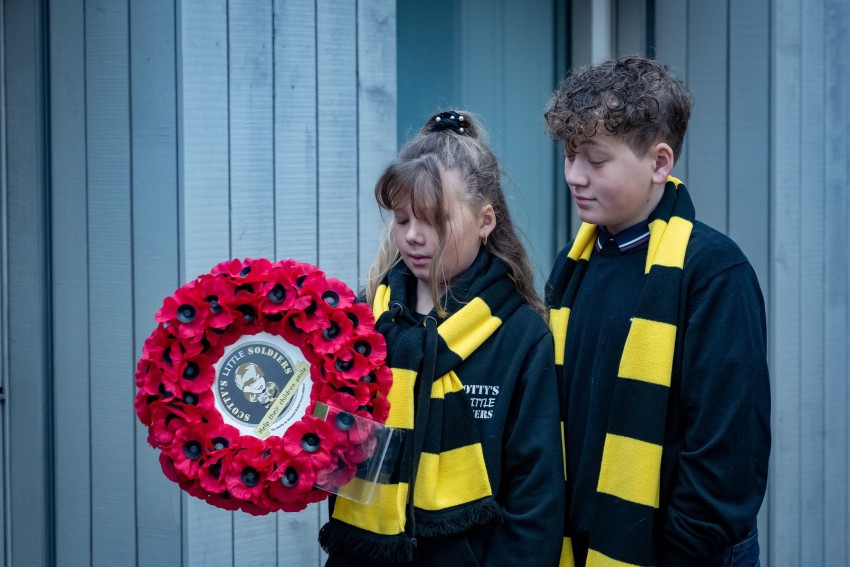
Why do we wear poppies on Remembrance Day?
Something we hear all the time at Scotty’s is how bereaved military children feel very alone and very isolated in their grief. But something as simple as wearing a poppy and respectfully taking part in a two-minute silence does so much to reassure them that the country is never going to forget them or the sacrifice of their parent.
I remember when my daughter, Brooke, was watching X Factor and Simon Cowell had a poppy on. She immediately grabbed me and said, “Mum, look! Simon Cowell is thinking about my dad.” It’s a feeling I’m sure all bereaved military children can relate to, and something they will all have their own stories about. Here are just a few things Scotty Members have said:
“It shows people remember. All these people would have died for nothing if no one remembered.”
“Seeing a poppy makes me feel really proud of my dad. It reminds me of the all the stuff he’s done for everyone to have better lives – not just me.”
“For me, the poppy shows that just because a bad thing happened, it doesn’t mean there’s no good stuff to come after. It’s like saying to me on a bad day that tomorrow will be great. There was this horrible war, but because of it we were able to see this really pretty flower.”
“It makes me happy to see people wearing poppies because it means they know what my dad did to make sure we have the lives we do.”
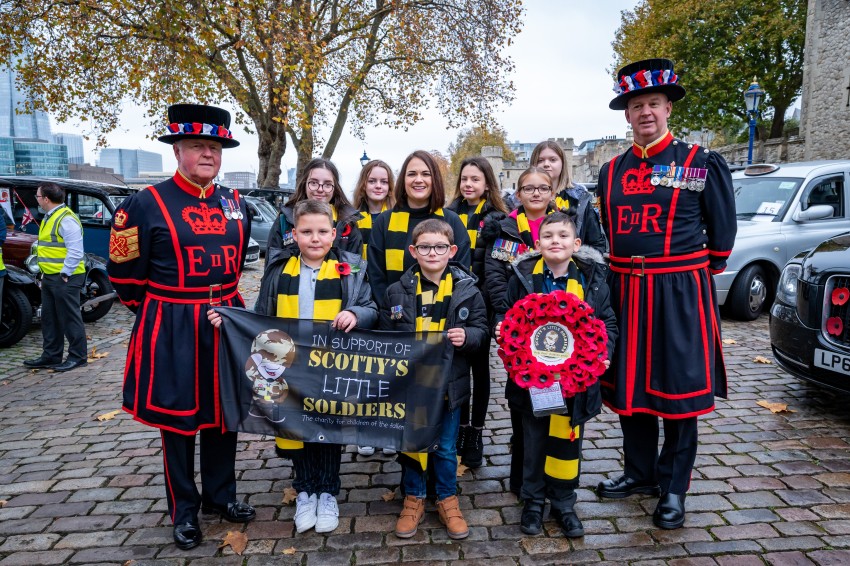
Why do Scotty’s attend the London Remembrance Parade?
Every year, Scotty’s attends the National Service of Remembrance in London with a large group of our members so that the children and young people we support have the chance to honour their parents together, as a community. We do this to show them they’re not alone, that there are other young people who understand what they’ve been through, and that their loved one has not been forgotten.
“Walking in the parade felt really good because it showed me there’s loads of people in the world who have been affected by war apart from me,” one Scotty Member told us. “It’s nice to be part of such a big event because it helps everyone remember all of the soldiers – not just my dad – who have put their lives on the line.”
Another said: “You’re finally around people who get it. You know what they’re thinking about and they know what you're thinking about. It’s the best bit about that day for me, because you see everyone cares and understands. It makes me so happy.”
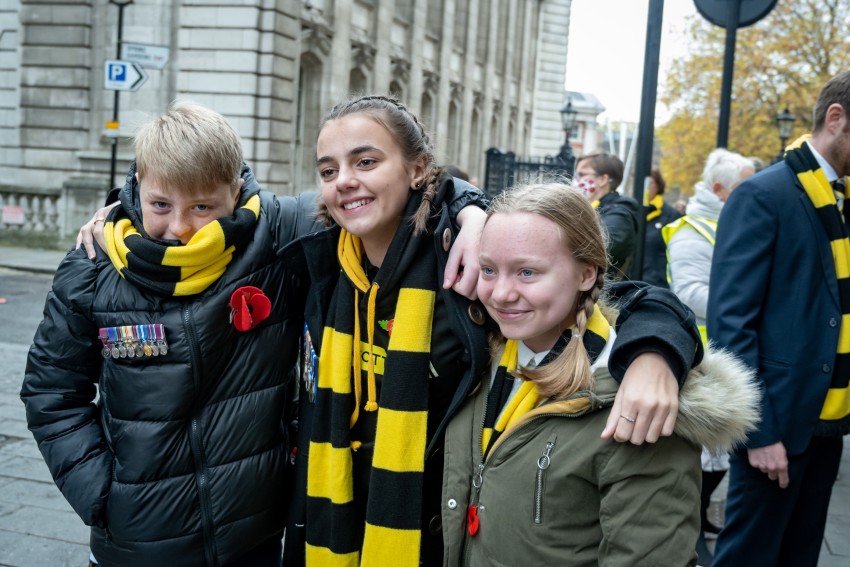
Why do Scotty’s wear black and yellow scarves at Remembrance?
Black and yellow were the colours of the 2nd Royal Tank Regiment which Lee served with – colours that Scotty’s Little Soldiers have adopted in his memory. We wear black and yellow scarves during Remembrance to honour the parents of our members and show we’re all united.
Want your own Scotty’s scarf to wear with pride? Buy one here.
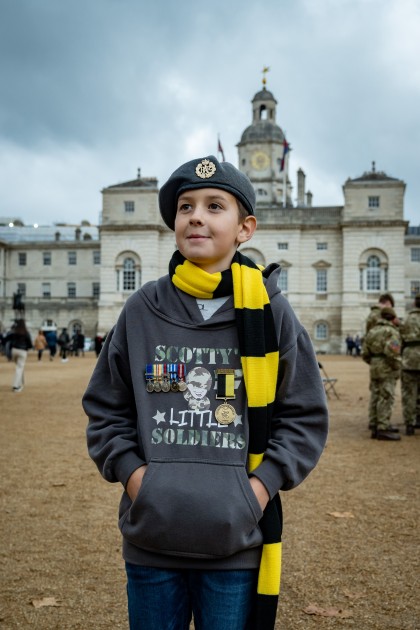
This Remembrance, remember bereaved military children
This year, on 11th November, let’s make sure to honour and remember all the brave servicemen and women of our country, while respecting the countless men, women and children who have experienced the death of a loved one who served in the British Armed Forces.
I think this Scotty Member put it best:
“For me, Remembrance really just means taking one day out of the year to remember everyone that has put themselves forward to serve our country. Taking one day out of the year to say thank you.”

Scotty’s Little Soldiers is a charity dedicated to supporting children and young people (0 to 25 years) who have experienced the death of a parent who served in the British Armed Forces.
Inspired by the experience of Army widow Nikki Scott, following the death of her husband Corporal Lee Scott in Afghanistan in 2009, the charity, which was set up in 2010, provides support and guidance to hundreds of bereaved military children and young people throughout their childhood.
Services offered to Scotty’s members include access to child bereavement support, guidance to parents and carers, personal education and learning assistance (including grants), and fun activities such as holiday respite breaks and group events. These are all designed to remind the children and young people supported by Scotty’s that they are not alone.
If you know a child or young person who has experienced the death of a parent who served in the British Armed Forces, they could be eligible for specialist bereavement support from Scotty's Little Soldiers. Hundreds of bereaved military children aren’t getting the support they need but we are here to help.
>> Click here to pledge your support for bereaved military children

